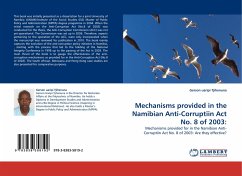This book was initially presented as a dissertation for a joint University of Namibia (UNAM)/Institute of the Social Studies (ISS) Master of Public Policy and Administration (MPPA) degree progamme in 2004. When the initial research on the Anti-Corruption Act (No.8 of 2003) was conducted for the thesis, the Anti-Corruption Commission (ACC) was not yet operational. The Commission was set up in 2006. Therefore, aspects pertaining to the operation of the ACC, were only incorporated when the manuscript was reviewed for publication in 2010. The book mainly captures the evolution of the anti-corruption policy initiative in Namibia, , starting with the process that led to the holding of the National Integrity Conference in 1998 up to the passing of the Act in 2003. The main thrust of the book is to gauge the effectiveness of the anti-corruption mechanisms as provided for in the Anti-Corruption Act (No.8 of 2003). The South African, Botswana and Hong Kong case studies are also presented for comparative purposes.
Bitte wählen Sie Ihr Anliegen aus.
Rechnungen
Retourenschein anfordern
Bestellstatus
Storno

